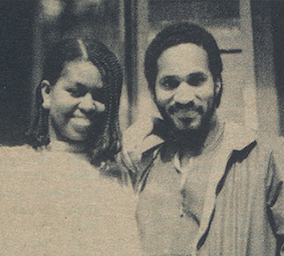PUL’s inclusive description working group shares progress on effort to describe collections accurately, respectfully

The description for this photo, from a 1984 edition of The Vigil, previously included only the name of Joey Harris '85. Recently, Library staff added the woman's name, Michelle Robinson (now Obama) '85. Princeton University Publications Collection, AC364, Box 19.
A team of archivists at Princeton University Library (PUL)’s Special Collections is working to describe archival materials in a manner that is accurate and respectful to the individuals and communities who create, use, and are represented in the collections.
“We recognize that our field has fallen short of this goal, particularly when we've described people from marginalized groups,” said Kelly Bolding, project archivist in the Americana manuscript collections and chair of PUL’s Archival Description and Processing Team's Inclusive Description Working Group (IDWG), formed in May 2019.
By using a reparative framework to redress past failures in describing people with respect and accuracy, IDWG’s efforts make records of marginalized groups more discoverable to researchers and bring to light more voices and stories in the collections. IDWG guidelines include prioritizing language that individuals and communities would use to describe themselves, updating archivist-supplied language, and discontinuing the perpetuation of inequalities in finding aids.
Archival description is not neutral, explained the group, and thus requires archivists to consciously interrogate their work and implicit biases in order to eliminate racist and oppressive description practices.
For example, PUL’s manuscripts include selected correspondence of Margaret Randall, some of which concerns activism within the LGBTQ community. Though Randall self-identifies as a lesbian, a previous finding aid did not identify Randall as such nor was there any description of LGBTQ content, said Bolding. To address the issue, an archivist added a sentence about Randall’s wife in the biographical note, as well as relevant subject headings and keywords.
Within the Princeton University Archives’s Office of the President Records, held at the Seeley G. Mudd Manuscript Library, a folder labeled with a male professor's name contained information about his wife, a female professor at the University as well, but the description did not previously acknowledge her, said Valencia Johnson, project archivist for student life and IDWG member. “The archivist added the woman's name in brackets to the man's name to make her records discoverable, while also leaving clear how the office originally named the file.”
IDWG encourages users to report problematic descriptions by suggesting a correction through the finding aids site. For more information about IDWG, view the webinar below.
Written by Emily Judd, Communications Coordinator
Media contact: Barbara Valenza, Director of Library Communications
Newsletter
Subscribe to Princeton University Library’s e-newsletter for the latest updates on teaching and research support, collections, resources, and services.
